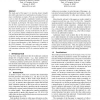Free Online Productivity Tools
i2Speak
i2Symbol
i2OCR
iTex2Img
iWeb2Print
iWeb2Shot
i2Type
iPdf2Split
iPdf2Merge
i2Bopomofo
i2Arabic
i2Style
i2Image
i2PDF
iLatex2Rtf
Sci2ools
111
Voted
ICCAD
2004
IEEE
2004
IEEE
On interactions between routing and detailed placement
The main goal of this paper is to develop deeper insights into viable placement-level optimization of routing. Two primary contributions are made. First, an experimental framework in which the viability of predictive models of routing congestion for optimization during detailed placement can be evaluated, is developed. The main criteria of consideration in these experiments is how (un)reliably various models from the literature detect routing hot-spots. We conclude that such models appear to be too unreliable for detailed placement optimization. Second, motivated by the first result, we present a unified combinatorial framework in which cell placement and exact routing structures are captured and optimized; the framework relies on the trunk-decomposition of global routing structures and optimization is performed by a generalized optimal interleaving algorithm [5]. A proof of concept implementation of this framework is studied in the FPGA domain. The technique can reduce the number o...
Detect Routing Hot-spots | Exact Routing Structures | Global Routing Structures | Hardware | ICCAD 2004 |
Related Content
| Added | 16 Mar 2010 |
| Updated | 16 Mar 2010 |
| Type | Conference |
| Year | 2004 |
| Where | ICCAD |
| Authors | Devang Jariwala, John Lillis |
Comments (0)

